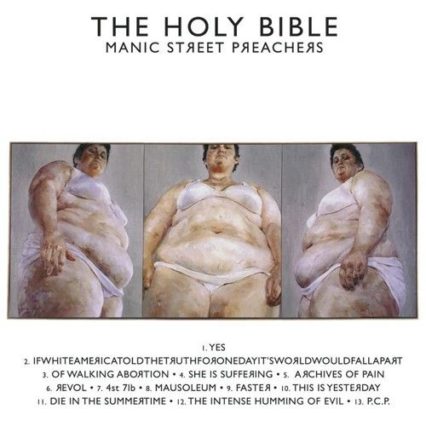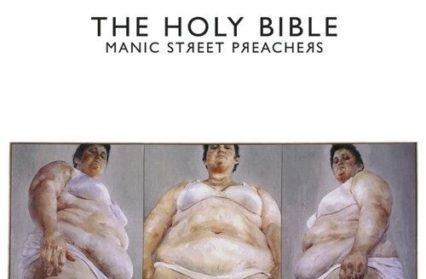In a new series for 2019, Wales Arts Review will be asking what are the greatest albums ever produced by Welsh musical artists? A wide selection of writers will be examining their favourites, and here David Roche looks at The Holy Bible by Manic Street Preachers.

I started teaching guitar in 2004. I was 13 or 14 and I’d put up a poster – made in MS Paint – of Yngwie Malmsteen dressed in an unbuttoned leopard print shirt playing a left-handed Stratocaster strung backwards for a right-handed player with ‘DO YOU WANT TO PLAY GUITAR?’ splurged on the top of the sheet. The only call I had was a local man who was looking for guitar lessons for his kid, I took him up on his offer. Before the first lesson, we chatted about the Manic Street Preachers. He was from Blackwood, had known them growing up, and they had made it. This was the first time I’d heard someone talk passionately about local, politically-minded, determined musicians. I was intrigued but didn’t really follow any of it up. It just made me want to be in a band.
A few years later my guitar teacher introduced me, during work experience, to Generation Terrorists. This ticked a lot of boxes. I’d spent the last 4 years learning as much of Appetite for Destruction as possible, I loved glam rock, and I was beginning to become more interested in politics – this album reached me at the right time. From Generation Terrorists I went on to Everything Must Go and then backwards to the subject of this article, The Holy Bible – a meteoric essay on suffering and my candidate for the greatest Welsh album ever made.
The Holy Bible showed me that genuine and meaningful art could come from Wales. More specifically, it showed me that it could come from the part of Wales that I lived in. It taught me that I had a right to express myself, to have opinions, and a right to be dissatisfied with the part of the world I was from and the world at large. For huge parts of Wales – particularly poorer, disadvantaged areas – these ideas are extremely powerful, a call to action, a reminder of self-worth.
I see The Holy Bible as a real, connected representation of discontent emanating specifically from a life growing up in the Welsh Valleys. The concerns about industrial decline, substance abuse, and left-wing politics feel so pointedly Welsh but what makes The Holy Bible so uncomfortable and transcendent – what sets it apart – is how universal these seemingly provincial ideas become in the hands of the Manics. Themes of financial suffering, political suffering, physical suffering, and mental suffering are explored on a global scale to phenomenal effect. Gone is the (sadly) naff grunge of Gold Against the Soul and the roaring angst of Generation Terrorists– it is replaced with music and a new aesthetic created by people that have dug beyond their roots in search of something new.
As we see the creation of albums decline in favour of smaller, single song releases I think it’s particularly important to remember works such as The Holy Bible. This is an experience best enjoyed as an album, end-to-end, uninterrupted. The virtuosic pacing is gripping, even when the music reaches its most unpleasant, rejecting moments. This is a hard album (‘She is Suffering’, ‘4st 7lb’, and ‘Of Walking Abortion’ are not easy to listen to) but Richey Edwards’ substantial lyrical contribution pieces of evidence a frankness and humility. His openness about his own mental health undoubtedly paved the way for discussions that would happen in the future – discussions that are still firmly relevant today.
Seeing a Welsh band create something so assured, opinionated, and impactful had a profound impact on my life. Generation Terrorists showed me that people from my part of the world could play rock music, The Holy Bible showed me that the experiences of growing and living in Wales could be made relevant to so much of the world. For me – and for many others – this music was an anthemic response to life in de-industrialised Wales, a call to arms. A wealth of experiences that people could relate to and find comfort in.
The gravelly, strained guitars and curiously Brit-pop drums sit alongside James Dean Bradfield’s stilted lyrical settings (the lyrics themselves being written by Edwards and Wire). The gait of his melodies is still something I find extremely difficult to anticipate and remember – you can definitely hear that he’s occasionally making the lyrics fit the music and this unsaddled feel always grabs my ears. I love the way the music feels disjointed and as though it’s not quite fitting together correctly, it forces me to listen to the music… which – again – isn’t always easy.
Forgetting the lyrics, The Holy Bible is relentlessly uncomfortable; angular riffs, unexpected rhythmic jolts, disgustingly dissonant music popping out of nowhere, and cruelly heavy and raw guitar parts grinding away. Listening to it as I write this article, I’m surprised by how the actual core of the music feels so volatile that it can barely contain itself – there’s a constant state of restraint battling against unexpected progressive rock, metal, punk, and hardcore influences. The guitar solos are grotesquely transformed into something that no longer resembles the 1980s flowerbeds they were picked from. There is nothing like this album. Its dense synthesis of influences makes it almost impossible to parody and only serves to drive home the Manics’ peculiar aesthetic.
The Holy Bible is grossly relevant to all of our lives. The rhetoric regarding wealth, surveillance, the politics of language, the insanity of genocide denial, mental health, physical abuse, and the role of white America in shaping the world is terrifyingly on-point. This album sees the Manics explode a kernel of Welshness into something transcendent, all-encompassing, and desperately reassuring. The Holy Bible isn’t just the greatest Welsh album, it is a towering monument to suffering.
The Holy Bible by the Manic Street Preachers is available here.
David Roche is a regular contributor to Wales Arts Review.
For other articles included in this collection, go here: The Greatest Welsh Album












